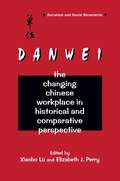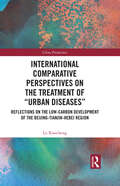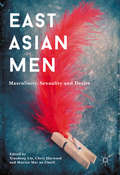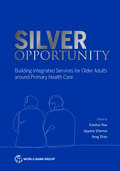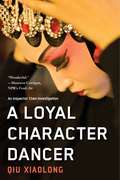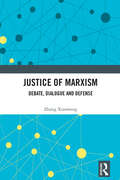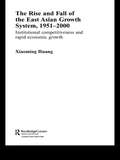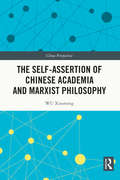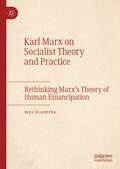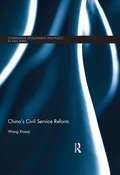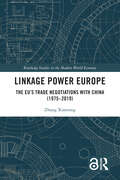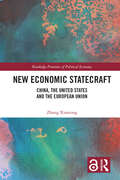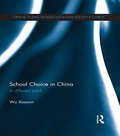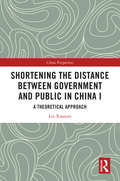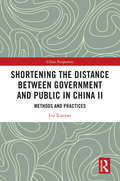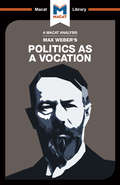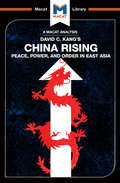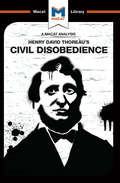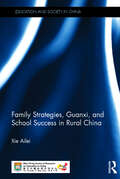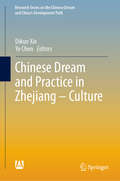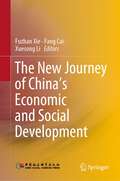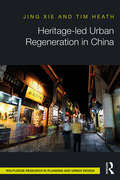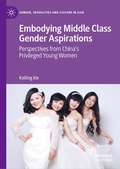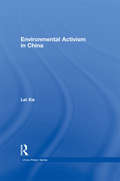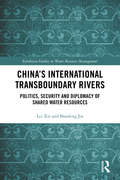- Table View
- List View
The Danwei: Changing Chinese Workplace in Historical and Comparative Perspective
by XiaoboThe danwei, or work unit, occupies a central place in Chinese society. To understand Chinese politics demands a better understanding of this system. This volume provides a systematic study of the danwei system and addresses a variety of questions from historical and comparative perspectives.
International Comparative Perspectives on the Treatment of “Urban Diseases”: Reflections on the Low-Carbon Development of the Beijing-Tianjin-Hebei Region (China Perspectives)
by Lu XiaochengWith an integration of theories, comparative and empirical studies, this book aims to find a treatment for Beijing’s “urban diseases” and coordinate a low-carbon development plan for the Beijing-Tianjin-Hebei region in China. Unprecedented industrialization and unconventional urbanization caused a series of “urban diseases” for developing cities across the globe. By summarizing and exploring the evolution and phased characteristics of “urban diseases”, the author implements theories across classical sociology, human ecology, community school, and low-carbon city as the base for policy recommendations. This book also provides in-depth examinations and comparative studies of other metropolises’ experiences in controlling “urban diseases”. Cities such as New York, London, and Tokyo were modeled to propose the most appropriate low-carbon development plan for the Beijing-Tianjin-Hebei region. With a focus on developing cities in Northern China, this book will be a great read to all scholars and students of environmental studies, development studies, urban studies, and contemporary China studies. It will also be a great addition for those who are interested in social conflicts and economic development.
East Asian Men: Masculinity, Sexuality and Desire
by Xiaodong Lin, Chris Haywood and Mairtin Mac an GhaillThis book provides a fresh and contemporary take on the study of men and masculinity. It highlights new and exciting approaches to sexuality, desire, men and masculinity in East Asian contexts, focusing on the interconnections between them. In doing so, it re-examines the key concepts that underpin studies of masculinity, such as homophobia, homosociality and heteronormativity. Developing new ways of thinking about masculinity in local contexts, it fills a significant lacuna in contemporary scholarship. This thought-provoking work will appeal to students and scholars of gender studies, cultural studies and the wider social sciences.
Silver Opportunity: Building Integrated Services for Older Adults around Primary Health Care
by Xiaohui Hou, Jigyasa Sharma, and Feng ZhaoWe live in a rapidly aging world, in which people who are age 60 and older outnumber children under the age of five. This book reveals large and growing gaps in care for older adults in countries at all income levels and shows how to leverage reforms for improving health outcomes for older adults and create healthier, more prosperous communities. Aimed at policy makers and other health and development stakeholders who want to promote healthier aging, Silver Opportunity compiles the latest evidence on care needs and gaps for aging populations. It argues that primary health care should be the cornerstone of integrated service delivery for older people, but primary health care systems must first build their capacity to respond to older people’s health needs. It presents an original framework for policy action to advance primary health care†“centered, integrated senior care; documents the experiences of pioneering countries in delivering community-based care to older people; and provides recommendations for decision-makers. The framework presents four policy levers with which to improve health care for seniors—financing, innovation, regulation, and evaluation and measurement—or FIRE. Finally, the book posits that by acting now, countries can leverage population aging to accelerate progress toward health equity and universal health coverage.
A Loyal Character Dancer
by Qiu XiaolongThe second book in the Inspector Chen investigationsInspector Chen’s mentor in the Shanghai Police Bureau has assigned him to escort US Marshal Catherine Rohn. Her mission is to bring Wen, the wife of a witness in an important criminal trial, to the United States. Inspector Rohn is already en route when Chen learns that Wen has unaccountably vanished from her village in Fujian. Or is this just what he is supposed to believe? Chen resents his role; he would rather investigate the triad killing in Shanghai’s beautiful Bund Park. Li insists that saving face with Inspector Rohn takes priority. So Chen Cao, the ambitious son of a father who imbued him with Confucian precepts, must tread warily as he tries once again to be a good cop, a good man and also a loyal Party member.
Justice of Marxism: Debate, Dialogue and Defense
by Zhang XiaomengThis book analyzes Marxian theories of justice within the context of contemporary political philosophy and intellectual history. Transcending perspectives from classical Marxism, the author analyzes how Western Marxism has engaged with critically and responded to the theories of justice, especially since the 1970s. The nine chapters cover major intellectual movements and multi-dimensional frameworks of thought that critique and understand anew the idea of justice, including anglophone debates on Marxism and justice, global distributive justice, and viewpoints from analytical Marxism, radical egalitarianism, the Frankfurt School, Marxian feminism and ecological Marxism. The second part of the book returns to the classical texts of Marxism, with a focus on historical materialism and a critique of capitalism to reinterpret basic tenets of justice in Marxism and to reconstruct Marxian theory of justice. This title will be of value to scholars and students interested in theories of justice, Marxian philosophy and political philosophy.
The Rise and Fall of the East Asian Growth System, 1951-2000: Institutional Competitiveness and Rapid Economic Growth (Routledge Studies in the Growth Economies of Asia #Vol. 42)
by Huang XiaomingHuang examines a recurring pattern of rapid economic growth in East Asia from 1951 to the present and explores how far a single East Asian Growth model can be said to exist. Assessing the various theories put forward to explain the phenomenon and supported by the most comprehensive data, the book finds that methods of institutional enhancement were at the core of the growth. This institutional enhancement affected state structure and functions, economic policy, corporate arrangements, social structure and relations, individual behaviour, and domestic and international interaction. Each of these elements was a critical aspect of the growth system that defined and propelled the rapid growth.
The Self-assertion of Chinese Academia and Marxist Philosophy (China Perspectives)
by WU XiaomingFrom a Marxist philosophical perspective, this collection of essays investigates the maturing self-consciousness and self-assertion of Chinese academia, especially within the humanities and social sciences, permitting more penetrating insights and critical engagement with the social reality of China.The author elaborates on the relationship between Hegel and Marx’s philosophy and their concepts of reality, thereby accounting for the historic and philosophical conditions for the autonomy of Chinese academia. Drawing on intellectual resources from both Eastern and Western archives, including phenomenology, philosophical hermeneutics, Western Marxism, and China’s pacifist tradition, the book refutes Huntington’s speculation about Chinese imperialism and delineates how China’s development can contribute to a fundamental critique of capitalist civilisation and a new paradigm of global governance. In addition, the book challenges the thinking of Chinese neo-liberals and nationalist-conservatives and their understandings of the history and social reality of China. Hence, the author advocates a reconstruction of the spiritual and intellectual realm within society based on Marxism, in order to counter Sinophobia, neo-liberalism, and nationalism at the same time.The book will appeal to readers interested in social and political philosophy, philosophy of history, Marxism, and China studies.
Karl Marx on Socialist Theory and Practice: Rethinking Marx’s Theory of Human Emancipation
by Wei XiaopingThis book discusses Marx’s thinking on human emancipation based on his critique of capitalism and the prospect of socialism. It analyzes the double relations between persons and things, and persons and persons by tracking Marx’s writings, including MEGA2, and taking into consideration the socialist practice and socialist reform of the last century. It is a necessary study for social scientists, social andpolitical philosophers, and students for its deep and wide analysis from the perspective of Marxian theory in practice.
China's Civil Service Reform (Comparative Development and Policy in Asia)
by Wang XiaoqiA market economy and a more liberal society have brought great challenges to China’s outdated governance structure and personnel management. To improve decision-making in government and reshape the management system in face of a more complex economy, post-Mao authorities have implemented a number of administrative reforms, including civil service reform which emphasized on selecting and promoting public officials based on their capability and work performance. Thousands of positions have been filled since the civil service system was implemented nationwide in 1993. The Chinese civil service reform is of far-reaching significance because it had the potential to be a departure from the established structure of cadre personnel management system developed in the 1950s. However, after several years of policy development, scholars observe that the new reforms have done little to undermine the old cadre system. Is this true? Or does this conclusion over-simplify the complicated implementation of the reforms? This book examines the implementation and performance of the on-going civil service reforms in China. Using the principal-agent framework, the author draw upon key case studies showing how the reforms affect civil servants’ incentives and behavior in the local context and the Chinese leadership’s control over the bureaucracy. China’s reform experience speaks directly to many Asian countries facing urgent need to improve state capacity as the global financial crisis unfolds.
Linkage Power Europe: The EU’s Trade Negotiations with China (1975-2019) (Routledge Studies in the Modern World Economy)
by Zhang XiaotongThis book looks at the history of the EU’s trade negotiations with China from 1975 to 2019 from a distinctive perspective – the EU as a linkage power. The author explains how the EU through linkage strategies speaks with one voice, overcomes its weakness in military capabilities and translates its non-military capabilities into advantages and influences in some specific policy areas. The book systematically traces the European negotiators’ tactics in managing the EU’s trade relations with China. It’s the first time that the history of EU–China trade negotiations is presented to the public by a seasoned trade negotiator. The author, combining the identities of a negotiator and a scholar, gives a panoramic view of EU–China trade relations from 1975, when the European Economic Community established diplomatic relations with China, to 2019 when the Juncker Commission leaves office. This book will appeal to policymakers, think-tankers, professors and students, as well as anyone who is interested in trade policies and negotiations in the EU and China.
New Economic Statecraft: China, the United States and the European Union (Routledge Frontiers of Political Economy)
by Zhang XiaotongThis book provides insights on the art of governing a state and managing its external relations from a wealth-power logic. It looks at "economic statecraft", which consists of wealth production, wealth mobilization, and wealth-power conversion by a state. This book reconceptualizes what economic statecraft is and proposes a new theory focused on wealth-power conversion. With a long historic perspective, this book goes through the modern history of Western powers practicing economic statecraft since 1500, and presents three case studies, the United States, the European Union, and China, the three biggest users of economic statecraft in the contemporary world. The book serves as an ideal reference for policy makers, businesspeople, and researchers whose work touch upon either wealth creation, power projection, or the combination of both.
School Choice in China: A different tale? (Education and Society in China)
by Wu XiaoxinSchool Choice in China explores the major characteristics of schooling options in China, highlighting how largely middle-class parents exploit their cultural, economic and social capital for their children's admission into choice schools. It highlights how payments such as choice fees, donations, prize-winning certificates and awards, as well as the use of guanxi, result in Chinese school choice as a parent-driven, bottom-up movement. The author also explores how schools and local governments cash in on the school choice fever in order to obtain significant economic returns, leading to policies that accommodate the needs of mostly middle-class families. He argues that although this system seems to create winners among the parties involved, it exacerbates the educational inequality that already exists in Chinese society. Chapters include: Positional competition for cultural capital Exploitation of social capital Economics of school choice Class reproduction through parental choice This book is not simply a detailed analysis of Chinese school choice practices, but also a study of the competitive middle class search for advantage for their children. As such it will be beneficial to undergraduates, postgraduates, education professionals, policy makers, and anyone with an interest in education, sociology, social policy, and the rise and future of China.
Shortening the Distance between Government and Public in China I: A Theoretical Approach (China Perspectives)
by Liu XiaoyanThe concept of Distance, in its traditional sense, connotes "estrangement" and "division", but in the context of modern political studies, it denotes a controllable resource which can be manipulated to change the relationship between the government and the public. Drawing on this key concept from western political science, the author explores the law and mechanisms of China’s political communication. In this volume, the author introduces a creative theoretical framework of distance, a dynamic system comprised of physical and psychological distance, ideal distance and real distance, as well as natural distance and consequent distance. Psychological distance is paramount, because it not only signifies whether there is trust between a government and the public, but also whether the political community can maintain a high degree of harmony, stability, unity, and vitality. Recent events in the China of Xi Jinping are used as cases to illustrate the point. Students and scholars who are interested in political science and political communication, especially Chinese politics, will find this title an essential reference.
Shortening the Distance between Government and Public in China II: Methods and Practices (China Perspectives)
by Liu XiaoyanThe concept of Distance, in its traditional sense, connotes "estrangement" and "division", but in the context of modern political studies, it denotes a controllable resource which can be manipulated to change the relationship between the government and the public. Drawing on the key concept of Distance from western political science, the author explores the law and mechanisms of China’s political communication. In this volume, the author conducts an empirical investigation of the distance between the government and the public in China. First, it discusses how the use of online social media, such as Weibo, can be used strategically to mediate the distance of offline communication. Then, it points out that social media can also lead to unlimited expression of general will, to which governments should pay attention. An empirical study of how the residents of five rural provinces in China obtain political information is used to illustrate the point. Students and scholars who are interested in political science and political communication, especially Chinese politics, will find this title a useful reference.
Politics as a Vocation
by Jason Xidias William Brett Tom McCleanGerman sociologist Max Weber’s 1919 lecture Politics as a Vocation is widely regarded as a masterpiece of political theory and sociology. Its central strength lies in Weber’s deployment of masterful interpretative skills to power his discussion of modern politics. Interpretation involves understanding both the meaning of evidence and the meaning of terms – questioning definitions, clarifying terms and processes, and supplying good, clear definitions of the author’s own. As a sociologist accustomed to working with historical evidence, Weber based his own work on precisely these skills, solidly backed up by analytical acuity. Politics as a Vocation, written in a Germany shocked by its crippling defeat in World War I, saw Weber turn his eye to an examination of how the modern nation state emerged, and the different ways in which it can be run – interpreting and defining the different types of rule that are possible. It is testament to Weber’s interpretative skills that Politics is famous above all in sociological circles for its clear definition of a state as an institution that claims “the monopoly of legitimate physical violence” in a given territory.
China Rising: Peace, Power and Order in East Asia
by Jason Xidias Matteo DianDavid C. Kang’s China Rising is a fine example of an author making use of creative thinking skills to reach a conclusion that flies in the face of traditional thinking. The conventional view that the book opposed, known in international relations as ‘realism,’ was that the rise of any new global power results in global or regional instability. As such, China’s development as a world economic powerhouse worried mainstream western geopolitical scholars, whose concerns were based on the realist assumption that individual countries will inevitably compete for dominance. Evaluating these arguments, and finding both their relevance and adequacy wanting, Kang instead turned traditional thinking on its head by looking at Asian history without preconceptions, and with analytical open-mindedness. Producing several novel explanations for existing evidence, Kang concludes that China’s neighbors do not want to compete with it in the way that realist interpretations predict. Rather than creating instability by jockeying for position, he argues, surrounding countries are happy for China to be acknowledged as a leader, believing that its dominant position will stabilize Asia, and give the whole region more of a hand in international relations. ¶Though critics have taken issue with Kang’s conclusions, his paradigm-shifting approach is nevertheless an excellent example of developing fresh new conclusions through creative thinking.
Civil Disobedience
by Jason Xidias Mano TothIn Civil Disobedience, Henry David Thoreau looks at old issues in new ways, asking: is there ever a time when individuals should actively oppose their government and its justice system? After a thorough review of the evidence, Thoreau comes to the conclusion that opposition is legitimate whenever government actions or institutions are unacceptable to an individual’s conscience. What is particularly interesting is that Thoreau’s creative mind took him deeper into the argument, as he concluded that this legitimate opposition really wasn’t enough. In Thoreau’s opinion, anyone who believed something to be wrong had a duty to resist it actively. These ideas were completely at odds with the prevailing opinions of the day – that it was the duty of every citizen to support the state. Thoreau connected ideas and notions in a novel manner and went against the tide, generating new hypotheses so that people could see matters in a new light. It is a mark of the success of his creative thinking that his views are now considered mainstream, and that his arguments are still deployed in defence of the principle of civil disobedience.
Family Strategies, Guanxi, and School Success in Rural China (Education and Society in China)
by Ailei XieResearch in school success in contemporary China has argued that market reforms have reproduced the advantages for children from the cadre and the professional families while simultaneously creating new opportunities for children of the new arising economic elites. However, it has performed less for traditional peasant families. This book places a special emphasis on how rural parents from different social backgrounds use guanxi (interpersonal social networks) to maintain the interconnectedness between their families and schools to create advantages for their children in school success. It investigates, by an ethnographic study in a rural county in middle China, how families from different social backgrounds within rural society get involved in the schooling of their children and how this contributes to different patterns of school success. The book argues that schools provide few formal and routine channels for rural parents to become involved in their children’s schooling. This raises the importance of family strategic initiatives to employ guanxi in the creation of advantages for their children’s school success. It concludes with discussions about guanxi as an important mechanism for social exclusion in post-socialist China. Chapters include: Family Strategies, Parental Involvement, and School Success The Roles of Parents: Voices of Parents in Zong Regarding School Involvement Policy Discourses: Missing the Link between Family and School Peasants: Family and Kinship The Blurring Division between Home and School This concise and comprehensive book is a qualitative study that will appeal to researchers and advance students in Chinese education and society.
Chinese Dream and Practice in Zhejiang – Culture (Research Series on the Chinese Dream and China’s Development Path)
by Dikun Xie Ye ChenThe theme of this book is the cultural construction in Zhejiang Province under the guidance of “China Dream” policy. It reviews the profound history of traditional culture in Zhejiang, and concludes with the modern practice and achievements by the local government. It reviews policies implemented in Zhejiang for the construction of socialist core values, public cultural services and cultural industry. The methodologies applied in this book mainly are living examples, case studies and policy presentations, as well as interpretations. The book covers several important areas in modern cultural scopes such as media, ideology, history and tradition, public culture construction and culture industrialization where the “China Dream” policy has the most influences. This book presents an interesting view for scholars and policy makers to better understand the important statecraft of China.
The New Journey of China’s Economic and Social Development
by Fuzhan Xie Fang Cai Xuesong LiThis book aims at China's economic and social development, which has embarked on a new journey. It collects more than 20 major research achievements of researchers in relevant fields of the Chinese Academy of Social Sciences. These topics cover rural revitalization and anti-poverty, industrialization and manufacturing transformation, service industry upgrading, fiscal and taxation system and fiscal sustainability, major financial reform, industry and competition policy, ownership structure, new pattern of opening up, digital economy, innovation driven, financial stability, macro-control, new urbanization, regional development, ecological environment, aging population, labor market, income distribution, social governance, people's livelihood, social security, the rule of law, cultural power, and other major issues. This book helps people from all walks of life better understand and grasp the new trends, opportunities, and challenges of China's economic and social development in the future and provides useful reference for thinking about China's medium and long-term development strategy and development path.
Heritage-led Urban Regeneration in China
by Jing Xie Tim HeathUrban planning, regeneration and design is an essentially cultural practice with the outcomes often depending upon an understanding of and engagement with the past. As cities in China strive to be competitive and attractive on the world stage, their decaying historical urban fabrics are being transformed into vibrant places through historical-cultural led urban regeneration, however, the impact of their rapid development has escaped serious scrutiny. Heritage-led Urban Regeneration in China presents the detailed evolution of three well-known historic streets in China: the Southern Song Imperial Street in Hangzhou; the residential Pingjiang Street in Suzhou; and the commercial Tunxi Old Street in Huangshan. From their original formation to their more recent regeneration, this book offers a critical evaluation of historical-cultural led urban regeneration projects in China and provides theoretical guidelines for contemporary practice in relation to its tangible and intangible urban heritage. Using interdisciplinary research in architecture, urban design, history and cultural studies, Jing Xie and Tim Heath provide a detailed analysis of the conservation and regeneration efforts of China as an emerging and pivotal world power. An invaluable resource for urban designers, urban planners and architects interested in and working in China, Heritage-led Urban Regeneration in China helps its readers to engage with the essential and invisible factors that produce these revitalised places while forming a critical view towards these projects.
Embodying Middle Class Gender Aspirations: Perspectives from China’s Privileged Young Women (Gender, Sexualities and Culture in Asia)
by Kailing XieThis book takes a feminist approach to analyse the lives of well-educated urban Chinese women, who were raised to embody the ideals of a modern Chinese nation and are largely the beneficiaries of the policy changes of the post-Mao era. It explores young women’s gendered attitudes to and experiences of marriage, reproductive choices, careers and aspirations for a good life. It sheds light on what keeps mainstream Chinese middle-class women conforming to the current gender regime. It illuminates the contradictory effects of neoliberal techniques deployed by a familial authoritarian regime on these women’s striving for success in urban China, and argues that, paradoxically, women’s individualistic determination to succeed has often led them onto the path of conformity by pursuing exemplary norms which fit into the party-state’s agenda.
Environmental Activism in China (China Policy Series #Vol. 9)
by Lei XieMajor environmental degradation is a serious problem for China as the country's economy continues to grow at a phenomenal pace. In recent years environmental organisations have begun to emerge in China, and in some cases have had remarkable success in affecting policies which would have had significant adverse impacts on the environment. This book, based on extensive original research, adopts a multi-disciplinary research approach to examine environmental activism in China, focusing on four cities. It analyses the nature, characteristics, strategies, organizational modes and influence of what could be labeled a Chinese environmental movement in-the-making. In particular, this volume highlights the specificities of Chinese environmental activism in an increasingly globalizing world, along with a comparison to the environmental movement in Western Europe and North America.
China's International Transboundary Rivers: Politics, Security and Diplomacy of Shared Water Resources (Earthscan Studies in Water Resource Management)
by Lei Xie Jia ShaofengChina has forty major transboundary watercourses with neighbouring countries, and has frequently been accused of harming its downstream neighbours through its domestic water management policies, such as the construction of dams for hydropower. This book provides an understanding of water security in Asia by investigating how shared water resources affect China’s relationships with neighbouring countries in South, East, Southeast and Central Asia. Since China is an upstream state on most of its shared transboundary rivers, the country’s international water policy is at the core of Asia’s water security. These water disputes have had strong implications for China’s interstate relations, and also influenced its international water policy alongside domestic concerns over water resource management. This book investigates China’s policy responses to domestic water crises and examines China’s international water policy as well as its strategy in dealing with international cooperation. The authors describe the key elements of water diplomacy in Asia which demonstrate varying degrees of effectiveness of environmental agreements. It shows how China has established various institutional arrangements with neighbouring countries, primarily in the form of bilateral agreements over hydrological data exchange. Detailed case studies are included of the Mekong, Brahmaputra, Ili and Amur rivers.
